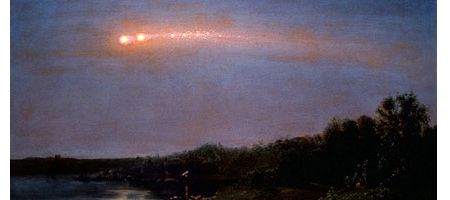Astronomers believe they have solved the mystery of what inspired Walt Whitman to write about a ‘strange huge meteor-procession’ in his poem Year of Meteors.

Whitman clearly spent a lot of time star-gazing, and a reference in the poem to a ‘great comet’ is clearly the Great Comet of 1860. The other celestial reference, says the research team, appears to have been to an Earth-grazing meteor procession.
A meteor procession occurs when a meteor breaks up upon entering the atmosphere, creating multiple meteors traveling in nearly identical paths.
“Meteor processions are so rare most people have never heard of them,” says physics professor Donald Olson. “There was one in 1783 and a Canadian fireball procession in 1913. Those were all the meteor processions we knew of.”
Whitman’s description has in the past been ascribed to the 1833 Leonid meteor storm, the 1858 Leonids and a fireball in 1859.
The researchers were able to discount the meteor storm because the timeframe conflicts with the poem’s. The 1858 Leonids were also out of the frame after the team discovered a dating error misattributing some of Whitman’s observations of the 1833 Leonids to 1858.
The 1859 fireball was well-documented and happened during the timeframe of the poem – but this was a single meteor which appeared during daylight, not a procession at night.
But a chance clue from the 19th century artist Frederic Church solved the mystery. Olson remembered having seen a painting in an exhibition catalog which showed the scene Whitman had described.
The Meteor of 1860 clearly depicted a meteor procession. Not only that, but the catalog gave the date of Church’s observation: July 20, 1860, well within the timeframe of Whitman’s poem.
Armed with this intriguing new date, the Texas State researchers began poring through newspapers of the time – and found that a large Earth-grazing meteor broke apart that night. It created a spectacular procession of multiple fireballs visible from the Great Lakes to New York State – so that Whitman would have had a perfect view.






